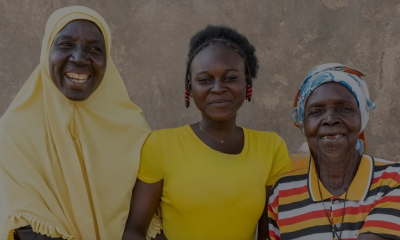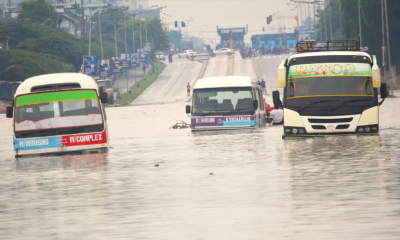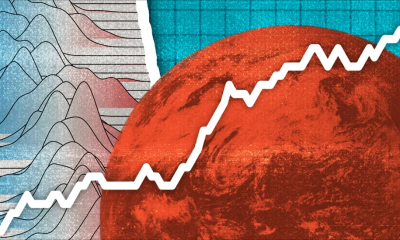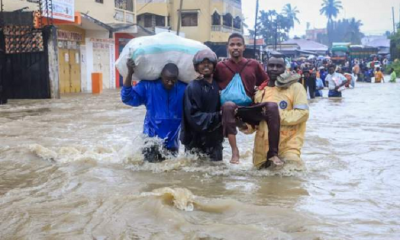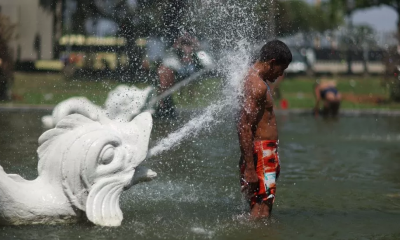Foreign News
Cambodia blames heatwave for deadly ammo blast
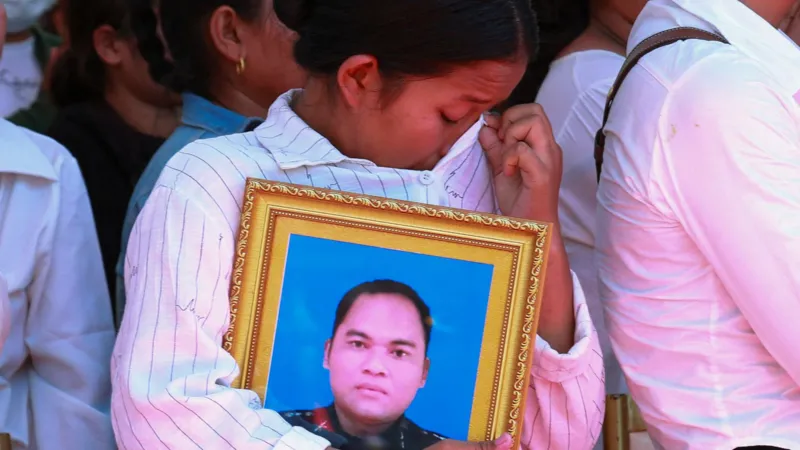
Cambodia has blamed factors including the heatwave gripping south-east Asia for a deadly ammunition warehouse explosion.
Twenty soldiers were killed in the incident in Kampng Speu province, Cambodia on Saturday.
Rejecting claims that rebellious soldiers were to blame, officials said the blast was caused by a combination of faulty munitions and extremely hot weather. Temperatures of up to 43C (109.4F) are forecast for the country.
An office building as well as nearby barracks were destroyed, with 25 nearby homes affected, reports said.
Images of the incident show a destroyed warehouse, a damaged military truck and a child with gashes being treated by medics. Multiple explosions can be heard on unverified social media video.
“The incident of the ammunition explosion on April 27, 2024… was a technical issue because the weapons are old, faulty, and the hot weather,” Cambodia’s defence ministry said in a statement, according to AFP.
Prime Minister Hun Manet has said he was “deeply shocked” by the blast. He said authorities would cover funeral expenses and pay compensation of $20,000 (£16,000) to the families of those killed, while injured soldiers will get $5,000, he said.
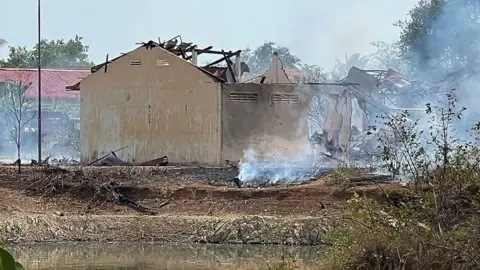
The families of the soldiers killed will receive compensation from the government (BBC)
Like large parts of south and south-east Asia, Cambodia has been struggling with hot weather in recent weeks. Temperatures could still hit 43C (109.4F) in the country by the weekend, Crisis24, a risk management company, told the Khmer Times.
In the Philippines, half the country is experiencing a drought with temperatures reaching highs in several areas.
The heat has forced Bangladesh to suspend classes. The measures have affected 33 million students.
In Thailand, 30 people died of heatstroke between January and 17 April this year, compared with 37 in the whole of 2023, the health ministry said.
Unicef has warned that more than 243 million children across eastern Asia and the Pacific are at risk of heat-related illnesses and death.
One climate expert has attributed the excessive heat to climate change and the impact of a powerful El Niño weather system in the western Pacific.
(BBC)
Foreign News
Ex-Malaysia PM Najib Razak given 15-year jail term over state funds scandal

Former Malaysian Prime Minister Najib Razak has been jailed for 15 years for abuse of power and money laundering, in his second major trial for a multi-billion-dollar state funds scandal.
Najib, 72, was accused of misappropriating nearly 2.3 billion Malaysian ringgit ($569m; £422m) from the nation’s sovereign wealth fund 1Malaysia Development Berhad (1MDB).
On Friday afternoon a judge found him guilty in four charges of abuse of power and 21 charges of money laundering.
The former PM is already in jail after he was convicted years ago in another case related to 1MDB.
Friday’s verdict comes after seven years of legal proceedings, which saw 76 witnesses called to the stand.
The verdict, delivered in Malaysia’s administrative capital Putrajaya, is the second blow in the same week to the embattled former leader, who has been imprisoned since 2022.
He was handed four 15-year sentences on abuse of power charges, as well as five years each on 21 money laundering charges. The jail terms run concurrently under Malaysian law.
On Monday, the court rejected his application to serve the remainder of his sentence under house arrest.
But the former prime minister retains a loyal base of supporters, who claim that he’s a victim of unfair rulings and who have showed up at his trials calling for his release.
On Friday, dozens of people gathered outside the court in Putrajaya in support of Najib.
The 1MDB scandal made headlines across the world when it came to light a decade ago, embroiling prominent figures from Malaysia to Goldman Sachs and Hollywood.
Investigators estimated that $4.5bn was siphoned from the state-owned wealth fund into private pockets, including Najib’s.
Najib’s lawyers claim that he had been misled by his advisers – in particular the financier Jho Low, who has maintained his innocence but remains at large.
But the argument has not convinced Malaysia’s courts, which previously found Najib guilty of embezzlement in 2020.
That year, Najib was convicted of abuse of power, money laundering and breach of trust over 42 million ringgit ($10m; £7.7m) transferred from SRC International – a former unit of 1MDB – into his private accounts.
He was sentenced to 12 years in prison, but saw his jail term halved last year.
The latest case concerns a larger sum of money, also tied to 1MDB, received by his personal bank account in 2013. Najib said he had believed the money was a donation from the late Saudi King Abdullah – a claim rejected by the judge on Friday.
Separately Najib’s wife, Rosmah Mansor, was sentenced to ten years in jail in 2022 for bribery. She is free on bail pending an appeal against her conviction.
The scandal has had profound repercussions on Malaysian politics. In 2018 it led to a historic election loss for Najib’s Barisan Nasional coalition, which had governed the country since its independence in 1957.
Now, the recent verdicts has highlighted fissures in Malaysia’s ruling coalition, which includes Najib’s party United Malays National Organisation (UMNO).
Najib’s failed house arrest bid on Monday was met with disappointment from his allies but celebrated by his critics within the same coalition.
Malaysia’s Prime Minister Anwar Ibrahim called for politicians on all sides to respect the court’s decisions.
Former Malaysian lawmaker Tony Pua told the BBC’s Newsday programme that the verdict would “send a message” to the country’s leaders, that “you can get caught for corruption even if you’re number one in the country like the prime minister”.
But Cynthia Gabriel, founding director of Malaysia’s Center to Combat Corruption and Cronyism, argued that the country has made little headway in anti-corruption efforts despite the years of reckoning after the 1MDB scandal.
Public institutions have not been strengthened enough to reassure Malaysians that “the politicians they put into power would actually serve their interests” instead of “their own pockets”, she told Newsday.
“Grand corruption continues in different forms”, she added. “We don’t know at all if another 1MDB could occur, or may have already occurred.”
(BBC)
Foreign News
Two dead in 50-vehicle pile up on Japan highway

A pile-up involving at least 50 vehicles on a highway in central Japan has left two people dead and 26 injured, according to police.
The incident was caused by a crash between two trucks, sparking a chain reaction that set at least 10 vehicles on fire, local police said.
A 77-year-old woman from Tokyo was killed, and another body was discovered in the driver’s seat of a burnt-out truck. Five people were seriously injured and 21 suffered minor injuries, police said.
There was a heavy snow warning in place at the time of the crash. Police believe icy surfaces likely caused the trucks to skid on the roads.
The crash happened on the Kan-etsu Expressway in Minakami, Gunma prefecture, about 160km (100 miles) north-west of Tokyo, at about 19:30 local time (10:30 GMT) on 26 December.
It took about seven and a half hours to put out the fire, police said.
Following the incident, a section of the highway was closed, with a long line of vehicles, many charred beyond recognition, stuck in the outbound lane. Work is under way to tow them away.
A man in his 60s, whose vehicle was involved in the accident, told local media outlet NHK he heard a loud explosion from the far end of the pile-up and saw fire during the crash. The blaze then spread to other vehicles, he said.
He said he was evacuated to a nearby toll gate with about 50 other people and spent the night in the hallway there.
Nexco, which operates the road, said checks were needed to see if the surface was damaged by the fire.
The company is warning travellers not to use the highway.
(BBC)
Foreign News
New York blanketed in snow, sparking travel chaos

New York has woken up to its heaviest snowfall in nearly four years after a winter storm blanketed parts of the US north-east.
New York City’s Central Park recorded 4.3in (11cm) of snow, its highest since January 2022, while other parts of the state saw up to 7.5in of snow, said the US National Weather Service (NWS).
New York Governor Kathy Hochul declared a state of emergency for more than half of counties in the state ahead of the storm.
On Saturday, more than 900 flights were cancelled, mostly in the New York area, while more than 8,000 were delayed nationwide, according to tracking website FlightAware.
(BBC)
-

 News7 days ago
News7 days agoMembers of Lankan Community in Washington D.C. donates to ‘Rebuilding Sri Lanka’ Flood Relief Fund
-

 News5 days ago
News5 days agoBritish MP calls on Foreign Secretary to expand sanction package against ‘Sri Lankan war criminals’
-

 Features7 days ago
Features7 days agoGeneral education reforms: What about language and ethnicity?
-
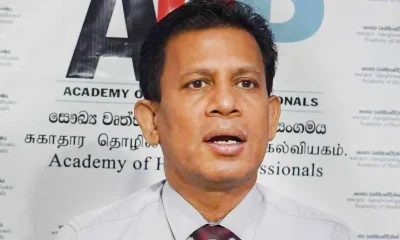
 News7 days ago
News7 days agoSuspension of Indian drug part of cover-up by NMRA: Academy of Health Professionals
-

 Sports5 days ago
Sports5 days agoChief selector’s remarks disappointing says Mickey Arthur
-

 News4 days ago
News4 days agoStreet vendors banned from Kandy City
-

 Editorial7 days ago
Editorial7 days agoA very sad day for the rule of law
-

 News7 days ago
News7 days agoUS Ambassador to Sri Lanka among 29 career diplomats recalled


